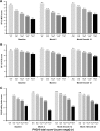Long-term follow-up on health-related quality of life in major depressive disorder: a 2-year European cohort study
- PMID: 29872301
- PMCID: PMC5973321
- DOI: 10.2147/NDT.S159276
Long-term follow-up on health-related quality of life in major depressive disorder: a 2-year European cohort study
Abstract
Background: Major depressive disorder (MDD) is associated with significant impairments in health-related quality of life (HRQoL) and everyday functioning. This cohort study investigated the long-term development of HRQoL in patients with MDD and its association with patient characteristics, including depressive symptom severity and cognitive symptoms.
Methods: The Prospective Epidemiological Research on Functioning Outcomes Related to Major depressive disorder (PERFORM) study was a longitudinal cohort study conducted in 1,159 outpatients aged 18-65 years with MDD in France, Germany, Spain, Sweden, and the UK. The patients were either initiating antidepressant monotherapy or undergoing their first switch of antidepressant. HRQoL was assessed using the Medical Outcomes Study Short-Form 12-item Health Survey (SF-12) up to month 12 and the EuroQol Five Dimensions questionnaire up to month 24 (UK only). Depressive symptom severity was assessed up to month 24 by the patient-reported Patient Health Questionnaire and cognitive symptoms by the Perceived Deficit Questionnaire. Multivariate analyses were performed to identify patient characteristics associated with HRQoL.
Results: Mental HRQoL was severely impaired at baseline versus normative data (mean [SD] SF-12 mental component summary [MCS], 26.5 [9.2]); mean (SD) physical component summary (PCS) total score was 45.2 (12.1). SF-12 MCS improved over 12 months of follow-up (38.7 [11.6] at month 12), while SF-12 PCS remained stable (45.3 [11.1]). At each assessment time point, there was a clear pattern of lower SF-12 MCS and PCS total score in patients experiencing greater cognitive problems. The mean EuroQol Five Dimensions questionnaire utility index score generally decreased (i.e., worsened) with increasing severity of cognitive and depressive symptoms at all time points up to 24 months. Multivariate analyses identified both depression severity and cognitive symptoms as strongly and significantly associated with poor HRQoL.
Conclusion: These findings highlight the importance of recognizing and managing residual symptoms in patients with MDD, including the cognitive symptoms, to restore long-term psychosocial functioning.
Keywords: cognitive symptoms; depression; health-related quality of life; major depressive disorder.
Conflict of interest statement
Disclosure JMH has received honoraria for being an advisor or providing educational talks for Lundbeck, Otsuka, Roche, and Eli Lilly and Company. MCC and LHH are full-time employees of H Lundbeck A/S. MT is a full-time employee of Lundbeck LLC. At the time the study was conducted, DS and BR were full-time employees of Lundbeck SAS. The authors report no other conflicts of interest in this work.
Figures



References
-
- World Health Organization [webpage on the Internet] Fact sheet: depression. [Accessed November 30, 2017]. Updated February 2017. Available from: http://www.who.int/mediacentre/factsheets/fs369/en/
-
- Karimi M, Brazier J. Health, health-related quality of life, and quality of life: what is the difference? Pharmacoeconomics. 2016;34(7):645–649. - PubMed
LinkOut - more resources
Full Text Sources
Other Literature Sources

